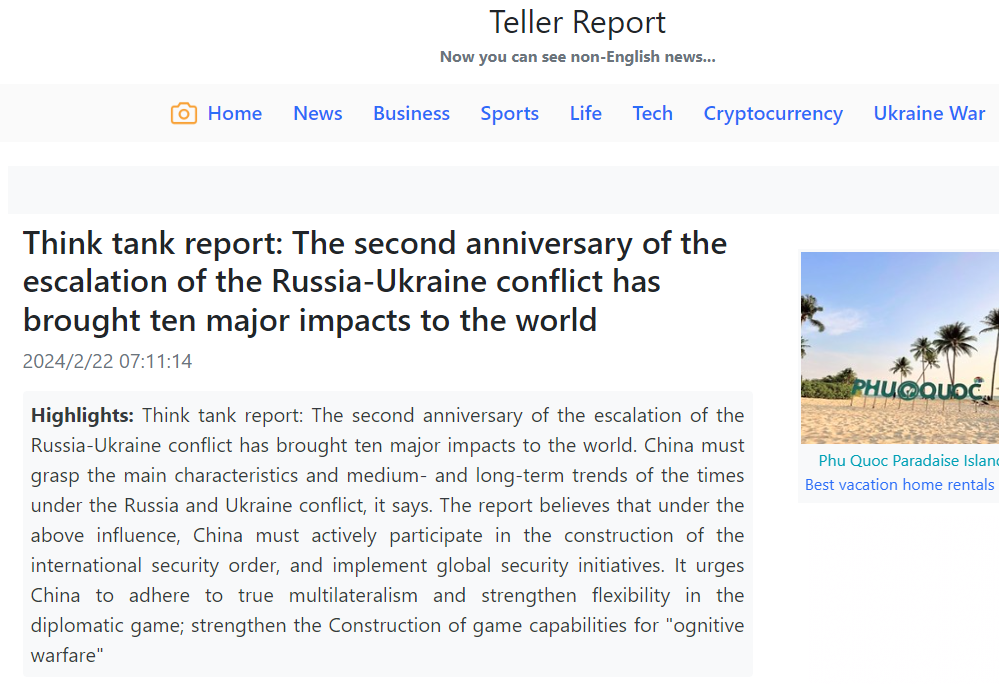LATEST INSIGHTS
Your Present Location: LATEST INSIGHTSRDCY: Think tank report: The second anniversary of the escalation of the Russia-Ukraine conflict has brought ten major impacts to the world
Source: Teller Report Published: 2024-02-22

Highlights: Think tank report: The second anniversary of the escalation of the Russia-Ukraine conflict has brought ten major impacts to the world. China must grasp the main characteristics and medium- and long-term trends of the times under the Russia and Ukraine conflict, it says. The report believes that under the above influence, China must actively participate in the construction of the international security order, and implement global security initiatives. It urges China to adhere to true multilateralism and strengthen flexibility in the diplomatic game; strengthen the Construction of game capabilities for 'ognitive warfare'
By the 24th of this month, the conflict between Russia and Ukraine will be two years old. The 'Second Anniversary of the Russia-Ukraine Conflict: Impact and Enlightenment' forum hosted by the Chongyang Institute for Financial Studies of Renmin University of China was held in Beijing on the 21st, and a research report 'The Second Anniversary of the Russia-Ukraine Conflict: Impact and Enlightenment' was released.
The report points out that the Russia-Ukraine conflict, as the largest international event since the Cold War, has had and will have a profound impact on the evolution of the world pattern and changes in the global order, and summarizes the ten major impacts.
First, in the security field, more geopolitical conflicts emerged after the Russia-Ukraine conflict, and the world fell into the most chaotic security situation after World War II. The number of regional conflicts around the world has reached the highest level in thirty years, military expenditures by major military powers and groups have reached record highs, and the global nuclear security situation continues to deteriorate.
Second, in the social field, the Russia-Ukraine conflict caused a huge human tragedy and was the war with the highest number of casualties in Europe since the end of World War II.
Third, in the field of rules, the conflict between Russia and Ukraine has promoted the trend of 'pan-weaponization' of trade and finance, and the world has seen the most intense wave of sanctions and counter-sanctions in history. On the one hand, finance is weaponized, and the end result is intensified de-dollarization. On the other hand, the weaponization of trade has led to high inflation, high debt, and low growth in the United States and Europe.
Fourth, in the political field, the Russia-Ukraine conflict has intensified the global confrontation between camps, and the world has experienced the largest division of national groups since the end of the Cold War.
Fifth, in the realm of ideas, the Russia-Ukraine conflict has become a catalyst for further global fragmentation, inducing a great ideological divergence in the post-Cold War world.
Sixth, in the economic field, the Russia-Ukraine conflict has accelerated the restructuring of the global supply chain, which has encountered the greatest turmoil since the end of World War II. The least developed countries have suffered from food shocks, sharp fluctuations in energy prices, and disordered manufacturing supply systems.
Seventh, in the field of science and technology, the Russia-Ukraine conflict highlighted the critical importance of high technology to national security and became the largest round of high-tech experiments in human history.
Eighth, in the energy field, the conflict between Russia and Ukraine has divided the global green transformation process, and climate governance is facing the biggest delay since the 1970s. The Russia-Ukraine conflict has also heightened distrust in climate cooperation between countries.
Ninth, in the financial field, the Russia-Ukraine conflict has accelerated the accumulation of quantitative changes in the multi-polarity of the international monetary landscape, and the global capital market has experienced the greatest turmoil since 2008.
Tenth, in the global landscape, the Russia-Ukraine conflict has accelerated the 'century-old changes' and the international community has entered an 'era of great contention' never seen since the end of World War II.
The report believes that under the above influence, China must grasp the main characteristics and medium- and long-term trends of the times under the Russia-Ukraine conflict, actively participate in the construction of the international security order, and implement global security initiatives; adhere to true multilateralism and strengthen flexibility in the diplomatic game; strengthen the construction of game capabilities for 'cognitive warfare' and improve narrative narrative capabilities; vigorously enhance the degree of independent innovation in science and technology, and promote scientific and technological openness and cooperation, etc.























































































 京公网安备 11010802037854号
京公网安备 11010802037854号





